Author
BOOKS
David has written four bestsellers and one of these -The Pope’s Children – is the best selling nonfiction ever published in Ireland.
His writing style is described by Bloomberg’s head of economics Stephanie Flanders, as having “a great knack for bringing a complex economics story to life. He is also funny. In economics, that’s a rare and persuasive combination.”
The definitive description of the Ireland we live in. Read it and weep.
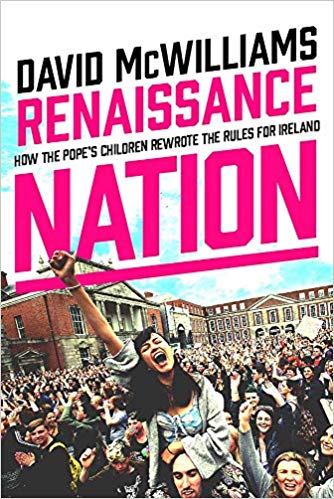
Renaissance Nation
How the Pope’s children rewrote the rules for Ireland
In four decades, book ended by the Pope’s visits to Ireland in September 1979 and August 2018, Ireland has become one of the wealthiest and most progressive nations in the world, a bustling home to multinationals and start-ups, seemingly immune to the strains of radical populism sweeping the Western world. It’s a far cry from the dreary and stagnant nation of 40 years ago. If we look at the data, but for the recent economic crash that should have but didn’t derail the country for decades, the Irish economy appears to have burst from the blocks in 1990 and kept on going.
So how did we manage it? How did we go from economic embarrassment to avocado toast in the space of a generation? The answer, David McWilliams compellingly argues, isn’t to be found in the official records of government. Instead, this was a revolution from below, born of ‘a million little mutinies’ in Irish society, a wholesale shift in the way normal people see and think about themselves.
Characteristically brilliant and timely, Renaissance Nation is a thrilling account of Ireland’s vertiginous rise and a timely exploration of its conflicted present, where stark decisions await the next generation of would-be revolutionaries.
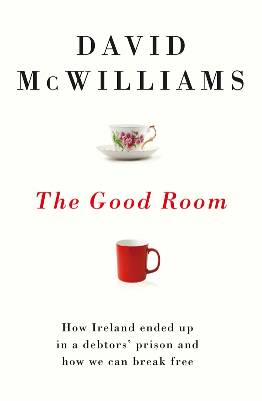
The Good Room
The Good Room provides a new way of looking at the economy because it is written through the eyes of a pregnant 32 years old teacher, Olivia Vickers. Olivia is the amalgamation of more than a few people I have met over the years who find themselves trapped between negative equity, a huge mortgage and negative equity. She is your sister, your daughter, your wife or your girlfriend.
Hers is the story of a generation, and more than anything else reinforces the point that economics is not about reams of figures such as GDP, inflation, or the current account, but it is the business of real people’s lives’.
In terms of economic policy, conventional wisdom and how it will change in the years ahead in Ireland, the central message of the book is that conventional wisdom — such as that followed and endorsed by the Irish establishment at the moment — is never defeated by some great countervailing idea which persuades the elite to change direct. Conventional wisdom is blown away by the great march of events. And the great big events are only the agglomeration of thousands of small events happening everyday, in every town and village all over the country in ordinary people’s lives — people like Olivia Vickers.
Ireland is deeply in debt, beholden to the IMF, the EU and the bond markets. Its economy is frozen, and years of austerity are ahead.
It didn’t have to be this way – and it doesn’t have to be this way. In The Good Room, David McWilliams, who wrote about the dangers of the Irish property bubble and imbalances within the eurozone at a time when other commentators were saying everything was fine, explains the bizarre economics behind Ireland’s current predicament, and illuminates a radically different path for the country. He illustrates the consequences of debt and austerity for ordinary Irish people and explains why austerity can’t work. And he shows that history offers numerous useful models for Irish recovery – provided we open our eyes to them.
The Pope’s Children was the book that connected the dots between economics and daily life in Ireland during the boom years. The Good Room does the same for the Ireland of the bust, and is – in its call for a completely different approach – an even more urgent and necessary work.
McWilliams has got the zeitgeist in his back pocket.
A brilliant guide for the layman…a deft dissection social mores. It is all great fun and you are bound to recognise yourself somewhere in there.
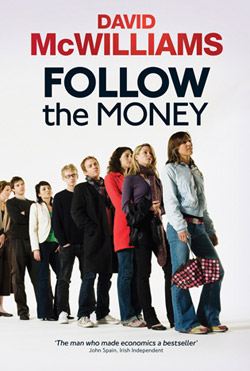
Follow the Money
The Pope’s Children are turning 30 and in the four years since David McWilliams introduced us to the generation that could have had it all, the Pope’s Children have been betrayed. This book is about real people and how good people can be broken by bad economics. But it doesn’t have to be like this. There is a way out.
We catch up with old friends, Breakfast Roll Man and Miss Pencil Skirt, and meet new characters like the Merchant of Ennis, Shylock and the Godfather. We have late night tea with Brian Lenihan and cross swords with Seanie Fitzpatrick. We learn why the average drug dealer on the side of the street has more in common with the banker than either would care to mention, as we follow the money o in both rackets o from its source at the very top right down to the ‘buy now, pay later’ deals at rock bottom. Why should we trust the people who got us into this mess in the first place? They were wrong then and they are wrong now. The politicians, bankers and developers think they can hand us the bill and walk away from the carnage. They want us follow a route that will make things worse for the ordinary man on the street while saving the bankers at the top of the tree, insisting that there is no other way. But there is an obvious alternative which has been adopted by every economy that has successfully emerged from this type of crisis. With the same sense of fun as The Pope’s Children, David McWilliams makes answering hard questions easy. In his typical breezy style, he suggests where to go from here. To be led up the garden path once in the past ten years is a tragedy; to be led up twice by the same people is unforgiveable. There is an alternative. Follow the Money is an optimistic and uplifting book about that alternative, which is well within our grasp if only we’d wake up and seize it.
A brilliant guide for the layman. A deft dissection of social mores. It is all great fun and , you’ll probably recognise yourself somewhere in there.
The most definitive guide of Ireland today. Read it and weep.
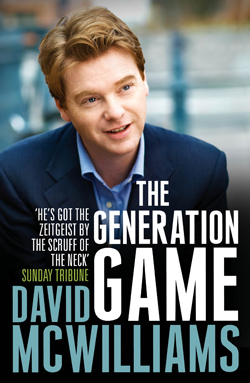
The Generation Game
The Bono Boomers, wedged between the winners and losers, are not about to grow up just because the economy turns down. They’ve too many important dates to keep, like ‘designer camping’ at the Electric Picnic. The Bono Boomers are Ireland’s first ‘permalescents’ – a permanently adolescent generation, too young to be old, too old to be hip.
When the Botox Economy is laid bare and the financial filler of others people’s money becomes evident, this Generation Game will play itself out as the Jaggers, Jugglers and Bono Boomers struggle to maintain their slice of a diminished pie.
However, the slow-down gives us the opportunity to take stock. There are plenty of reasons to be optimistic. Taking a trip around the globe from Shanghai to New York, from Latin America to Central Europe, we can learn from history and appreciate that Ireland has a unique economic resource: our Global Tribe. If we exploit the demographic potential of the Diaspora, we can re-invigorate the nation.
The twenty-first century gives us the opportunity to see the island of Ireland as the cradle of a global nation which extends worldwide and is gelled together by the shared experience of the Tribe.
The prosperity of future Irish generations is based on harnessing the collective power of past generations. This is the global Generation Game.
It is bright, pacey clever and entertaining and full of attitude, not unlike the people it surveys.
McWilliams makes a compelling argument for the need for a different approach to Irish and European economic management.
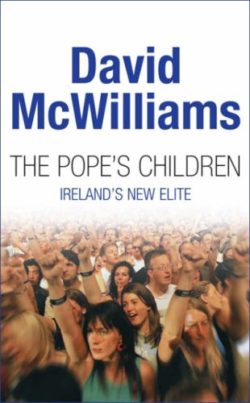
The Popes Children
Meet the huge new Irish middle class: young, sassy and successful.
The Pope’s Children is an antidote to the endless pessimism of the Commentariat, official Ireland’s gloomy opinion mongers, forever seeing a glass half empty that is in fact three-quarters full. There is a vast surge of ambition, new money, optimism and hope out there. That’s the real story: The Pope’s Children tells it – and tells it with style.
Related News
